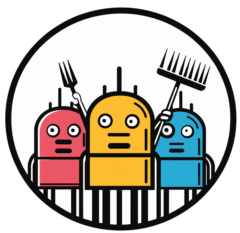Imagine saying to a machine: I wish I could speak Akkadian. And instead of a blank stare, it nods politely and begins surrounding you with a world in which Akkadian is normal. Cartoons chatter in it, bedtime stories arrive in it, recipes explain themselves in it. Before long, you’re dreaming in the tongue of Babylon.
It sounds fanciful, but the technology is almost in place. We already have AI systems that can clone a voice from thirty seconds of tape, adjust lip movements to match any dubbed language, and generate dialogue in regional dialects with convincing fluency. The old barrier – that to learn a language you needed flesh-and-blood speakers to create a world around it – is crumbling. Machines can now conjure such worlds to order.
For adults this is revolutionary enough. Learning Japanese, for instance, often collapses at the plateau stage: you get “good enough” to order food or watch anime with subtitles, and then the world has no patience for your stumbling politeness forms. But if the world is simulated – infinitely patient, endlessly adjustable, ready to use as much Japanese as you can handle and no more – then you can climb past the plateau at your own pace.
For children the implications are wilder still. Parents have always created little linguistic enclaves to pass on their heritage: German spoken with Papa, Italian with Nonna, Danish with the neighbours. But most multilingual dreams collapse when one of those contexts disappears. The child adapts to the easiest path, usually the majority language, and the smaller ones fade to passive understanding.
With AI, the enclaves don’t vanish. They can be multiplied. Peppa Pig in Latin, Frozen in Norwegian, Minecraft in Swahili: each language becomes the unquestioned ruler of its chosen domain. Children absorb them not as “homework” but as the natural language of their dinosaurs, their cartoons, their puppet theatre.
And once that is possible, the revival of small languages and dialects is no longer quaint nostalgia but a practical option. Why let everything be dubbed in American or RP English when you could have it in Orkney Norn, Doric or Ulster Scots? Parents in Shetland might decide their children deserve to hear stories in the language of their great-grandparents, and with enough of them doing so, the revival ceases to be eccentric. It becomes desirable, even inevitable.
None of this is pure fantasy. Eight years ago I wrote that the next breakthrough in translation would come not from bilingual dictionaries but from machines learning the meaning of words from monolingual use – and then shifting that meaning across languages. That old prediction looks less outlandish now that large language models can translate, mimic, and invent in dialects they were never explicitly trained on.
The future of language may not be further flattening into global sameness, but a great divergence: the rebirth of patois, the return of the weird. A world where the voices of our ancestors whisper again – not just in archives and textbooks, but in the everyday chatter of cartoons, films, and games.
Not everyone will be interested, but I reckon a surprising amount of us will.
